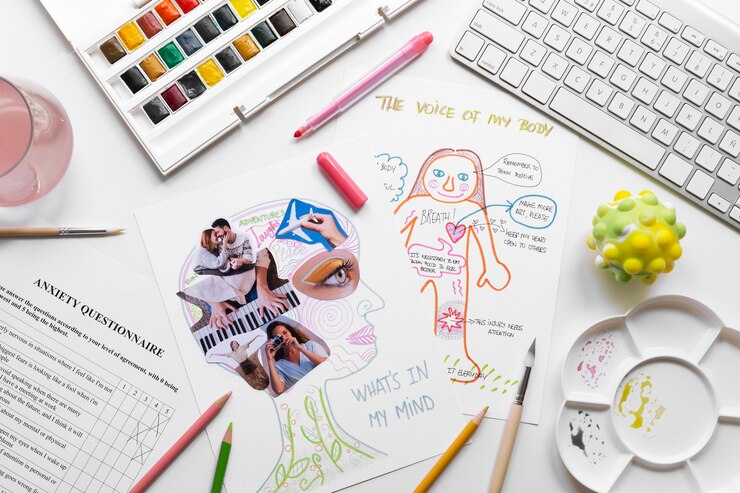
Adults aren’t the only ones who sometimes need a mental health day. Kids can also feel the weight of academic, social, and extracurricular stress. Taking time to unwind and recharge is important for them too. Continue reading to explore 10 mental health activities for kids suggested by a mental health professional, aimed at helping your child find balance and rejuvenation.
Table of Contents
—
“Even if I’m okay with giving my child a mental health day, what should we do?”
This is a common question from parents considering offering their stressed or overwhelmed child a day off from school or their usual routine. Fortunately, the answer is simple and doesn’t require much planning or expense.
While your child might be tempted to spend the day glued to a screen, engaging in some mental health activities can make their time off more productive and offer a better emotional reset. Having an open discussion early in the day about expectations and involving your child in choosing some activities can help lead them back to calmness and confidence.
Here are some impactful activities that have proven effective in boosting kids’ emotional well-being.
Related read >> 100 ways to boost mental health
The best way you can support your child on a mental health day is by connecting with them emotionally and relationally. This means giving them your full attention and genuinely listening to understand their thoughts and feelings, rather than just to reply.
When parents respond with warmth and sensitivity, children are more likely to form secure attachments—relationships that nurture confidence and emotional health. Research shows that such parenting can shield children from toxic stress.
Pro Tip: Connecting with younger kids often happens through play and shared activities rather than direct conversation, so pay attention to the ways your child usually opens up.
Physical activity offers numerous benefits for mental health. Moving our bodies allows emotions to be processed, releases feel-good endorphins, and reduces the stress hormone cortisol. Aerobic exercise, in particular, has been found to be as effective as medication and therapy for depression and anxiety.
The American Psychological Association notes:
“Young people who exercise more tend to have lower levels of depression, stress, and psychological distress, and higher levels of self-image, life satisfaction, and well-being.”
Pro tip: Ask your child if they want to pick an activity to “move our bodies” or have you choose one for them, giving them some control if they need it.
Life can sometimes feel like running on a treadmill, moving from one task to another without direction. To help your child gain perspective, their brain needs some quiet time to reflect and grow.
Silence at times offers chances for self-reflection and daydreaming, activating various parts of the brain. It helps reduce internal noise and enhances focus on what truly matters, promoting mindfulness.
Pro Tip: Simply allow your child an unscheduled stretch of time to navigate as they wish.
Play is not just fun for kids—it’s critical for their cognitive and social development, stress relief, and emotional expression. Megan Gunnar, Ph.D., at the University of Minnesota, explains that play provides children with stress control by allowing them to engage in activities voluntarily, fostering a sense of control and predictability.
Pro-tip: Embrace your inner child and engage in play with your child. Let them guide the playtime to meet their needs for control and predictability.
Related read >> 75 Calm Down Strategies for Kids (That Really Work!)
Journaling is an excellent activity for a mental health day, offering kids a safe space to express their thoughts. Writing helps kids process emotions they might struggle to verbalize, providing a place for dreaming and problem-solving.
Clinical Social Worker Yanique Chambers advises that journaling allows kids to explore feelings without fear of judgment, helping them to understand and manage inner conflicts.
Pro-tip: Use emotion flashcards to inspire your child’s writing, helping them articulate how they feel and why.
Art provides another way for children to process strong emotions. Creating art gives kids a channel for emotional expression and mindfulness.
Art materials serve as safe outlets, allowing kids to translate feelings into manageable visuals through movement, color, and imagination.
Pro-tip: Set up an inviting art space and offer a variety of tools for your child to explore.
Music therapy is widely used in pediatric settings for its calming effects. Music helps kids manage stress by supporting relaxation and self-regulation.
Educator Nancy Kopman notes that children’s music for rest and relaxation can help them learn self-soothing skills, a key to managing stress.
Pro tip: Explore Spotify for calming music playlists or check out Nancy’s collection for kids.
Today’s typical child’s diet is often high in processed foods and sugars. Using a mental health day to introduce more nutritious, whole foods can positively influence their mood and habits.
What we eat impacts our mood and vice versa. While many factors affect mental health, food is one of the most manageable.
Pro tip: Prepare a healthy meal together with your child, benefiting from improved mood, fun, and connection.
Related Read >> 75 Ways to Show Love to Your Child and Boost Their Self-Esteem
A mental health day is a great opportunity to introduce mindfulness activities to your child. Practices like meditation help shift them from stress mode to a calm, focused state.
Benefits of mindfulness for kids include improved focus, self-control, and well-being, along with reduced stress and disruptive behavior.
Pro tip: Explore tools that promote calm and focus through mindfulness practices with your child.
A day off provides the perfect opportunity to pause from the hustle and assess what’s working or not in your child’s life.
Goal-setting teaches kids to take responsibility for their learning and fosters a positive, can-do attitude.
Pro Tip: Utilize goal-setting resources for kids to make it easy and enjoyable.
Spending time in nature has long been associated with reduced stress and improved emotional health. A day outside can help your child enjoy similar benefits: lower stress hormones, improved mood, and reduced anxiety.
Pro-tip: Take an indoor activity outdoors—whether it’s lunch, a book, or a game, you can enjoy it outside.
Kids might seem like their days are filled with excitement, but they face stresses like academic pressures, sports demands, and social conflict. Taking a step back with these mental health day activities can give them much-needed relaxation, reflection, and reset time.
Check out other articles in the series:
– Kids Need Mental Health Days: 9 Misconceptions that Need to Change Now
– 7 Surefire Signs Your Child Needs a Mental Health Day
Other parenting articles you might like:
– 75 Awesome Calm Down Strategies for Kids (that they’ll actually want to try!)
– The Best Mindset for Parenting a Spirited, Emotionally Intense Child
– 10 Insights of Remarkable Parents from a Family Therapist
– Easy Ways to Bond with Your Child (Even When There’s No Time in the Day)
– 10 Everyday Ways to Improve Your Child’s Mood and Behavior
This post was originally published on 7/12/2021 and has been updated.



